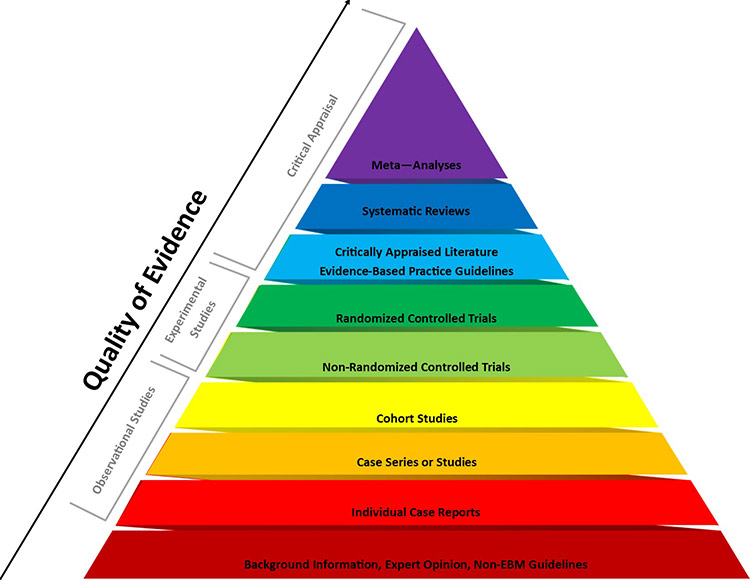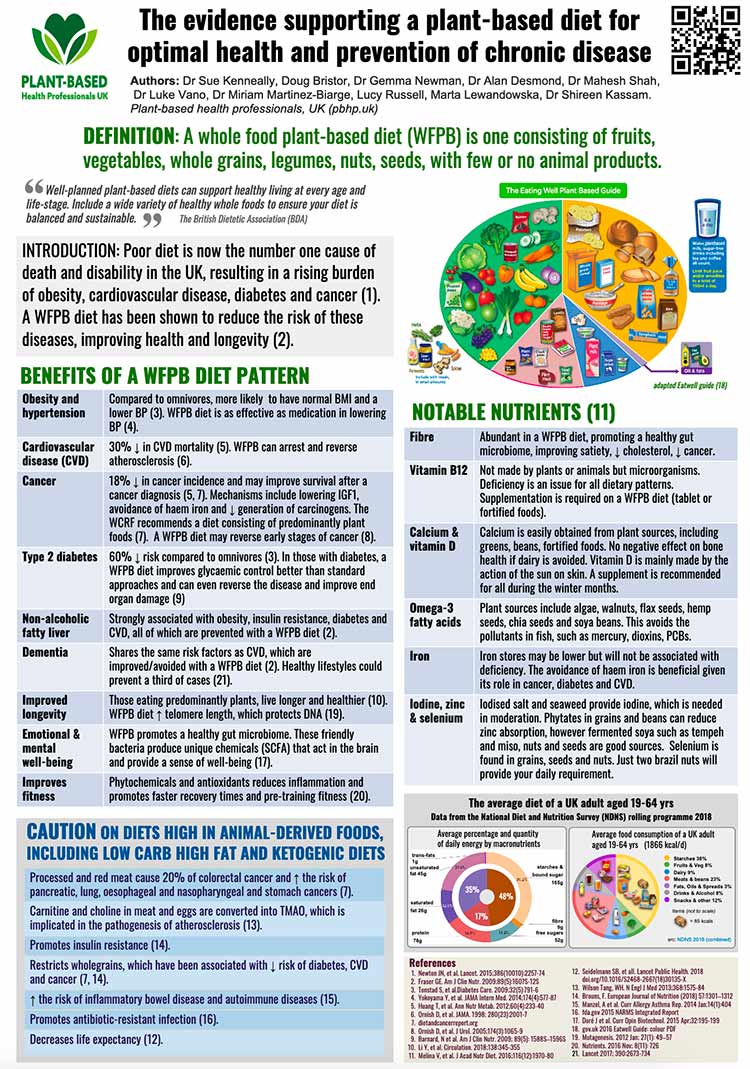Plant based diet propaganda

Executive summary
* At a recent conference, Dr David Unwin came across a leaflet published by an organisation called “Plant Based Health professionals UK.” The leaflet summarises the claimed benefits for a Whole Food Plant Based (WFPB) diet. The leaflet contains 21 references used to make a number of strident claims such as “A WFPB diet may reverse early stages of cancer” and “WFPB can arrest and reverse atherosclerosis.”
* Any fool can cherry pick one reference for one condition to make one diet look good. That’s what this leaflet has done. The same could have been done by proponents of a Whole Food Animal Based diet, but that would be equally disingenuous and unscientific.
* Consuming whole (real) food, as opposed to processed (junk) food will have health benefits. The debate is: what should that whole food be? If evidence is found for WFPB eating, does the benefit derive from the whole food (no debate) or the plant based (open to debate)?
* Among the 21 references, WFPB diets were rarely the subject of focus. Only 1/21 references involved a vegan diet as an intervention (where cause can be shown). Typically vegetarian diets were studied, and these vegetarian diets were often defined as including eggs, dairy, fish and occasional meat. (I would never have accepted that as a definition of a vegetarian diet when I was one – eating eggs and dairy, but never meat or fish.)
* The evidence quality of the 21 references is poor (I will use the same reference numbers in this article as were used in the leaflet). Below is a pyramid of evidence.

- Only 1/21 papers (Ref 4) was a meta-analysis of clinical trials and they weren’t all randomised controlled trials (RCTs).
- There were 2/21 meta-analyses of Prospective Cohort Studies (Refs 5 & 12). These can only establish associations.
- There were three randomised controlled trials (Refs 6, 8 & 9). Two of these (Refs 6 & 8) were multiple intervention trials (smoking cessation, aerobic exercise, diet, stress management and weekly support groups). The leaflet attributed the entire benefit to the diet alone. In two of the RCTs, the comparator diet was the typical western diet. In the third it was the recommended American Diabetes Association diet. I’m not surprised that any whole food diet beats the Standard American Diet.
- There were two Prospective Cohort Studies (PCSs) (Refs 3 & 19). These can only establish association. One was a PCS of US Seventh Day Adventists; the other was a PCS of 56 Italians – neither would be generalisable to whole populations.
- One was a cross-sectional study (“case series” on the evidence pyramid) (Ref 20) of 27 vegetarians and 43 omnivores from Arizona. This can only establish association and is not generalisable.
- Seven were review papers (Refs 1, 2, 10, 14, 15, 17 and 21). Ref 1 was a review of the burden of disease in England and it concluded that diet is a big issue – no debate. Ref 2 was a (2009) review of ‘vegetarian’ diets (which allowed for fish and occasional meat). Ref 10 was a review of longevity in the US population and five healthy behaviours (not smoking, not being sedentary, being a healthy weight, score on “the Alternate Healthy Eating Index” and not drinking excessively). Ref 14 was a review of low carb high fat diets. Ref 15 was a review of the ‘Western diet’ (defined as high fat, salt, sugar, junk) on inflammatory and autoimmune disease. Ref 17 was a review/opinion piece on gut microbiota and health. Ref 21 was a review article on dementia, where the diet of focus was the Mediterranean diet. Even if we generously place all of these review articles on the third layer down of the pyramid (and few would justify this), they are not about WFPB diets anyway.
- Four were reports/position statements (Refs 7, 11, 16 & 18). Ref 7 was a report/position statement by the World Cancer Research Fund – an organisation notorious for its anti-meat stance. Even this report concluded that dairy products decrease the risk of colorectal cancer and they must have looked hard to find something against fish: “Cantonese-style salted fish increases the risk of nasopharyngeal cancer.” Nothing was found against eggs (Ref i). Ref 11 was a position statement by the US Academy for Nutrition and Dietetics (AND) giving their view of vegetarian diets. I wrote about the AND position recently, when they unforgivably supported a vegan diet for infants and toddlers (Ref ii). Ref 16 was a report on antibiotics and their use in animals in the food supply. Ref 18 was the plant-based version of the ‘Eatwell’ Guide. The ‘Eatwell’ Guide is bad enough – I didn’t know that there’s a vegan version!
- The final reference (Ref 13) was a bizarre two-part paper – the first part involved giving 2 hardboiled eggs to 40 participants; the second part involved following 4,000 participants for 3 years. It turns out that this paper found nothing to support WFPB diets anyway.
* All the claims in the leaflet are written as if they apply to everyone, or everyone with a certain condition (e.g. those with diabetes). This is false. Few, if any, of the papers are generalisable to whole populations. E.g. one claim (Ref 8) was “A WFPB diet may reverse early stages of cancer.” The reference given for this involved 93 American men with prostate cancer. If results were found to support a WFPB diet (and they weren’t), they would only be applicable to American men with prostate cancer. The type 2 diabetes and blood pressure claims were based on a (2009) study of US Seventh Day Adventists (SDAs). Nothing for any non US SDAs to worry about.
* All the claims in the leaflet are written as if causation has been proven. Only 1/21 papers referenced (Ref 9) could claim causation – and that paper only applied to 99 Americans with type 2 diabetes, where a whole food diet beat the American Diabetes Diet.
* There are many lies in the leaflet. A number of papers referenced to support claims did not make the claims attributed to them. The leaflet claimed “WFPB diet is as effective as medication in lowering BP (Ref 4).” Ref 4 did not compare diet with medication; full stop. The “60% reduced risk of diabetes” claim does not exist in the reference given for this (Ref 3). A claim was made about blood pressure; the reference for this claim did not mention blood pressure (Ref 3). A claim was made about phytochemicals; the reference for this claim did not mention phytochemicals (Ref 20). A claim was made about carnitine; the reference for this claim did not mention carnitine (Ref 13). The claim “…obesity, insulin resistance, diabetes and CVD, all of which are prevented with a WFPB diet” (Ref 2) is complete fabrication. No diet can prevent all of those conditions.
The leaflet is plant-biased rather than providing evidence for a plant-based diet.
Introduction
Many thanks to Dr David Unwin for the subject of this week’s note (although maybe not for the workload!) David spoke recently at a conference and saw a presentation from someone from an organisation he hadn’t heard of (and nor had I): The Plant Based Health Professionals UK (Ref iii). David picked up a goodie bag and found the following leaflet in it. (The leaflet can be found on their site here) (Ref iv).
The leaflet contains 21 references in support of a plant-based diet and/or attacking an animal foods-based diet. The first author, Dr Sue Kenneally is a member of the Fit For Life Forever team (Ref v). “The overall aim of Fit For Life Forever is to promote health and well-being within the Body of Christ. It is endorsed by health professionals who, in response to the obesity epidemic especially, have a desire to see the church become part of the answer rather than part of the problem.” Kenneally is a Director of the British Society of Lifestyle Medicine (BSLM) (Ref vi), which is the British arm of the global Seventh Day Adventist, plant-based, Lifestyle Medicine movement. Belinda Fettke has led the investigative research to uncover what this web of people and organisations are up to – from Kellogg’s to Coca-Cola, with sexual restraint in-between. I highly recommend reading some of her fascinating posts (Ref vii). The church has also boasted about its aims to turn the world vegan (and Seventh Day Adventist, no doubt) (Ref viii).
The leaflet is one of those things that intuitively doesn’t make sense. In most presentations I am currently giving, I am including a section on what we should eat. I go back to the first principles of what human beings need to consume and the answer is complete protein, essential fats, (there are no essential carbohydrates), vitamins and minerals. Animal foods provide complete protein; plant foods don’t (plants can be combined to get complete protein – good luck with that). Animal foods provide essential fatty acids in the form in which the body needs them; plant foods don’t. Animal foods provide retinol, B12, D3, and heme iron; plant foods don’t. The inescapable conclusion that you come to when you study nutrition is that we are designed to consume animal foods. (And I was a vegetarian when I discovered this, so my confirmation bias was working against this finding).

The rest of this article is available to site subscribers, who get access to all articles plus a weekly newsletter.
To continue reading, please login below or sign up for a subscription. Thank you.




